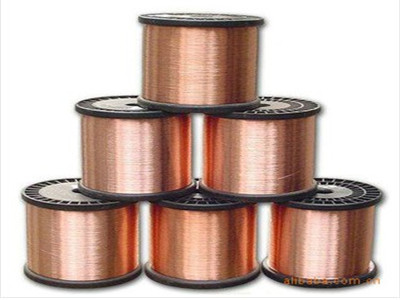In terms of electrical conductivity, copper is considered the strongest and most reliable metal today for building wire systems. It has an excellent current carrying capacity, and its superior conductivity makes it the standard against which all other electrical conductors are matched or compared.
In fact, if we compare copper to aluminium, we’ll find that copper building wire requires less insulation and smaller conduits. This is because aluminium has lower conductivity, and so it would have to be larger in diameter to carry the same current. In a given conduit, more copper wire can be packed in than aluminium. This “wire fill” holds importance when a system is rewired or expanded.
 Physical strength
Physical strength
Copper is one strong metal. It is resistant to breaks, nicks, stretching, and other stress factors. It wins over aluminium hands down, and this strength of its makes it the conductor of choice when it comes to wiring systems in the building field.
Copper’s superior tensile strength allows it:
- To have increased current carrying capacity
- To resist dangerous overheating
- To reduce waste
- To withstand ‘creep,’ which is what specialists call the bending of metal under stress
- To defy ‘fatigue failure’ which occurs due to flexing and vibration
Not for nothing is copper known as the most reliable metal. It has many other plus points too, making it the metal of choice in several other industries too.
Other good points
Another benefit of copper is its compatibility with brass, typically brass plated screws. This helps it resist both corrosion and creep. Its installation is real easy and there’s no requirement of any special tools or compounds. Copper’s flexibility ensures that it is joined perfectly and it is hard enough to keep these connections set securely in place.
While this metal is strong and sturdy enough, it is amazingly flexible and resilient. It can be easily bent in junction boxes, twisted and pulled hard, and yet it stays unbroken and un-stretched. There’s no other metal that can offer such robust bendiness.
Many Electrical Wire Manufacturers go for coatings on copper wires. The most commonly used metal for coating copper wires is tin. Tinned copper wires are used in several applications across many industries. The coating saves the wire further from corrosion and oxidation.
With any metal, it is not just the initial cost that is considered. The life cycle cost, which is inclusive of maintenance, repair, installation, service calls, etc., is kept in mind too when it is measured on the scale of economic viability. In this context, though aluminium’s initial cost is lesser than copper’s, its life cycle cost is much higher.
Copper is an extremely cost-effective metal. Its efficiency and performance make it a much superior metal over all others, especially in the electrical industry.
Several leading providers of wires, such as Rajasthan Electric Industries, offer the best quality wires at modest, industry rates. They can be counted on for their durable products that deliver excellent value throughout their lifecycle.